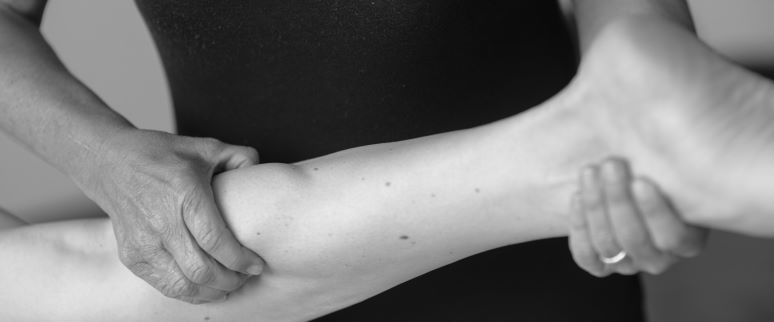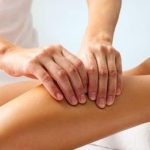The course is addressed to Physiotherapists, Doctors and other health professionals.
Course’s language will be Greek.
LLLC, EPIMORFOSIS organizes a seminar “Trigger points and Peritoneum Trunk, Lower limbs” certified by IMTT® (Interessengemeinschaft fur Myofasziale Triggerpunkt – Therapie)with professor Kosta Kyprioti.
The seminar lasts 4 days and will be held in Thessaloniki.
The cost of the seminar is 470€. To finalize your participation, a deposit of 170€ must be paid.
The remaining amount of 300€ must be deposited at least 2 days before the start of the seminar.
Objective
 Several problems in orthopedic patients are related to dysfunction of the soft tissues and especially the muscle – fascia complex.
Several problems in orthopedic patients are related to dysfunction of the soft tissues and especially the muscle – fascia complex.
These problems include:
Pain due to Myofascial Trigger Points (MTrP). Pain can be caused primarily due to MTrP formation, or secondary MTrP formation linked to the development of an arthrogenic, neurogenic or internal organ dysfunction.Reduced Range of Motion in the joints, due to stiffness of the soft tissues, such as fascia, or due to pain generation when the soft tissues are getting stretched.
Dysfunctional Patterns of Movement due to changes in muscles and fascias.Peripheral Neurogenic Symptom Reproduction due to a dysfunctional relationship between neural tissues and myofascial nerve environment.
This set of courses presents a complete approach of the assessment and treatment of myofascial dysfunctions based on modern clinical reasoning.
In terms of assessment the courses presents:
- Systematic processes of Subjective and Physical Examination for the identification of myofascial dysfunctions.
- Assessment of patterns of posture and movement, related to the development and the sustainability of myofascial dysfunctions.
- Processes of differentiation between myofascial pain problems and other types of impairments (neurogenic, arthrogenic and internal organ relevant pathology).
In terms of treatment the courses present a range of techniques for:
- The management of pain caused by Myofascial Trigger Points (MTrP).
- Normalization of the Range of Movement, through techniques of lengthening and gliding of the connective tissue (fascias)
- Neural mobility optimization options, though treatment techniques of the myofascial environment.
The Education program consist of 3 courses. Each course has the duration of 4 days.
Upper Quadrant Manual Myofascial Course – 4 days – Manual techniques for problems in the neck, head, shoulder girdle and upper limb.
Lower Quadrant Manual Myofascial Course – 4 days – Manual techniques for problems in the thorax, low back, pelvis, hips and lower limb.
Dry Needling Course – 4 days – The main Dry Needling applications for upper and lower quadrant problems. Only participants successfully attended both myofascial courses (manual 1 and 2) are eligible to attend the Dry Needling Course.
The Educational Program in Brief: Myofascial Mov Dysf
This series of courses is approved by the international educational association IMTT.
 IMTT (Interessengemeinschaft für myofasziale Triggerpunkt-Therapie, Society for Myofascial Trigger Point Therapy) has been founded in 1995 and focuses on the study of myofascial pain and the development of manual and “dry needling” techniques for the treatment of myofascial trigger – points.
IMTT (Interessengemeinschaft für myofasziale Triggerpunkt-Therapie, Society for Myofascial Trigger Point Therapy) has been founded in 1995 and focuses on the study of myofascial pain and the development of manual and “dry needling” techniques for the treatment of myofascial trigger – points.
The IMTT forms an integrative treatment approach combining manual and dry needling techniques in the MTrP region, manual techniques for influencing fascial mobility, stretching and relaxation exercises as well as functional strengthening and ergonomical advices.
Lower Quadrant Manual Myofascial Course
– Relation between myofascial trigger points (MTrP) and pain.
– Myofascial influences in joint range of motion and neural mobility influences.
– MTrP Palpation techniques in muscles of the thorax, low back, pelvis, hips, lower limb.
– Basic procedures for differentiating pain of myofascial origin from primary arthrogenic, neurogenic and internal organ dysfunctions.
– Application of manual treatment techniques for MTrP’s.
– Analysis of patterns of posture and movement linked to the development and the sustainability of dysfunctions of extensibility and gliding of fascias.
– Application of manual techniques for fascia mobility optimization for the normalization of patterns of posture, movement and neural mobility.
Discussion in aspects of patient’s self – management and overall approach of the contributing factors, for the optimal rehabilitation and the reduction of the relapse possibilities, for a series of clinical conditions such as:
- Pain in the thorax
- Low back pain with or without referred pain in the lower extremity
- Piriformis syndrom
- Hip pain
- Patellofemoral pain syndrom
- Shin Splints
- Foot pain
Day 1
08.30 – 09.00 Introduction to the course
09.00 – 10.30 Lecture: Myofascial dysfunction up to date
10.30 – 10.45 Break
10.45 – 12.30 Practical revision: Assessment and Manual Treatment Techniques for myofascial trigger points and for optimizing the mobility of the fascias
12.30 – 13.30 Break
13.30 – 15.30 Practical work: Thoracic pain
15.30 – 15.45 Break
15.45 – 17.00 Practical work: Thoracic hypomobility
17.00 End of day 1
Day 2
08.30 – 10.30 Lecture: The influence of the myofascial system to neural mobility
10.30 – 10.45 Break
10.45 – 12.30 Practical work: Low back pain
12.30 – 13.30 Break
13.30 – 15.30 Practical work (con’t)
15.30 – 15.45 Break
15.45 – 17.00 Practical work: Gluteals / the piriformis syndrome
17.00 End of day 2
Day 3
08.30 – 10.30 Lecture: Connective tissue and Stretching
10.30 – 10.45 Break
10.45 – 12.30 Practical work: Hip and thigh pain
12.30 – 13.30 Break
13.30 – 14.30 Practical work (con’t)
14.30 – 15.30 Practical work: Iliotibial band syndrome
15.30 – 15.45 Break
15.45 – 17.00 Practical work: The patellofemoral pain syndrome
17.00 End of day 3
Day 4
08.30 – 10.30 Practical work: Pain in the tibia
10.30 – 10.45 Break
10.45 – 12.30 Practical work: Foot pain
12.30 – 13.30 Break
13.30 – 14.30 Clinical reasoning group work
14.30 – 15.00 Questions Remarks
15.00 End of the course
*Time schedule components may change
1. Credit or Deposit card payment
You can deposit the down payment or the total fee via credit or deposit card (Visa, Mastercard & American Express) from the webpage of each course, through VivaPayments.
You are solely responsible for the proper entry and the genuineness of your credit/deposit card’s details. EPIMORFOSIS bears no responsibility in case of any error.
Any payment commission is charged to EPIMORFOSIS
2. Deposit – Transfer to our bank account.
You can deposit or transfer the requested amount for your registration to the following accounts, writing your full name in the field “Reason for the Beneficiary”:
PIRAEUS BANK:
ΙΒΑΝ: GR5501722380005238070348955
SWIFT(BIC): PIRBGRAA
NATIONAL BANK of GREECE:
IBAN: GR6801102170000021744103439
SWIFT(BIC): ETHNGRAA
ALPHA BANK :
ΙΒΑΝ: GR4801407080708002002013410
SWIFT(BIC): CRBAGRAA
EUROBANK:
ΙΒΑΝ: GR4502600370000010201090153
SWIFT(BIC): ERBKGRAA
Beneficiary: EPIMORFOSIS KENTRO EPIMORFOSIS STELECHON YGEIAS OE
The bank transfer fee charged to EPIMORFOSIS
1. A certificate of attendance, a degree or a diploma will be issued.
2. Printed handouts are provided (notes or relevant book).
3. In case of cancellation of the seminar due to EPIMORFOSIS’s responsibility, deposited fees will be refunded immediately.
4. EPIMORFOSIS reserves the right to change the date or postopone seminars, informing participants by phone and / or sms & e-mail. In such a case participants are entitled to request full refund of their fees if they do not wish to attend the seminar on the new date or to use this amount for their participation in other seminars or services of the company.
5. In the event of a strike, government’s bans, heavy bad weather, and generally any event beyond the reasonable control of the organisers which impedes the execution of part or all of the seminar, the organizers reserve the right to change the date and time of the event. In this case the fees are not refundable but are valid as they are.
6. Cancellation of participation due to participant’s responsibility is possible only by email, as follows:
• up to 30 days prior to the start of the seminar, all deposits are refundable.
• up to 15 days prior to the start of the seminar, 50% is refundable.
• no refund after this deadline, exceptions could be only by decision of EPIMORFOSIS.
7. The realisation of the course will be confirmed by email or/and sms to be sent to participants, in time.
8. It is advised to not buy your flight tickets until you receive this confirmation email (or/and sms).
9. LLC-1 EPIMORFOSIS keeps the right to change course venues.
You can make your own reservation declaring the name of epimorfosis.
Holiday Inn . More information:
Tel.: +30 2310 563 100

Trigger Points και περιτονία – Κορμός, Κάτω άκρα (ΙΜΤΤ approved) – ΘΕΣΣΑΛΟΝΙΚΗ 2025
€170.00 – €470.00
Training, a steady value for more than twenty years now, leads physiotherapy and keeps it at a very high level, well done to George Karambalis and his associates, we owe a lot to all of you.
EPIMORFOSIS organizes specialization seminars for rehabilitation professionals. I’ve watched a lot. I strongly recommend you trust EPIMORFOSIS for your specialization and lifelong information.
EPIMORFOSIS justifies its name by providing high quality courses. George Karampalis operates more like a constant “trainee” and less like an entrepreneur, and this is an additional positive fact in the effort that is put by the workers and teachers of EPIMORFOSIS.
I have known George Karampalis and EPIMORFOSIS for many years. I’ve had the opportunity to join several clinical courses and I can argue that, at the level of organisation and selection of trainers, they have a high level of recognised prestige.
My first steps in professional specialization started with EPIMORFOSIS and continue. It has been with us all these years, covering the need for modern and documented knowledge, in collaboration with internationally acclaimed educational institutions.
The best physiotherapists training institution. It enables the development of the necessary knowledge for clinical reasoning. High-quality training without having to travel abroad.


 Smart
Smart